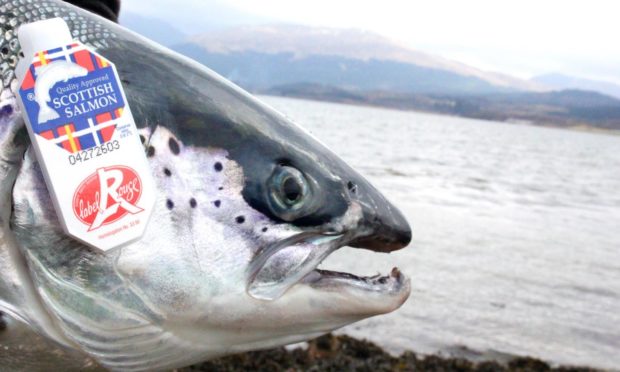Scotland’s salmon farmers have called for urgent action to address discrepancies with export statistics published by the UK Government.
The Scottish Salmon Producers’ Organisation (SSPO) said there was an urgent need for irregularities in post-Brexit HM Revenue and Customs (HMRC) export figures to be addressed in order for the full impact of Britain’s withdrawal from the EU to be known.
Figures released by HMRC for January suggest 80 tonnes of Scottish salmon were exported to Europe.
Official EU Eurostat import figures put the figure at 4,500t, while Scottish salmon producers say they exported close to 5,000t in the first month of this year.
Giving evidence to the Scottish Affairs Committee in the UK Parliament, SSPO strategic engagement director Hamish Macdonell told MPs there was a real issue over the validity of the export statistics published by HMRC.
We don’t know who is to blame or where the problem has come from.”
Hamish Macdonnell, SSPO
Speaking outside the committee, Mr Macdonell said: “Scotland’s salmon producers sent about 5,000 tonnes of salmon to Europe in January.
“The Eurostat system, which records how much Scottish salmon went into the EU, records about 4,500 tonnes arriving there.
“Yet according to the official HMRC figures – published on behalf of the UK Government – we only exported 80 tonnes, which is only about 3% of the amount that actually went there.
“There has been a big problem at the very least in January in terms of the collation of the figures.
“Something happened to do with the way the figures were collected, and we don’t know who is to blame or where the problem has come from.
“But unless we can get a really proper baseline of how much fish is actually going into Europe it is impossible to tell what the impact of Brexit is.”
Investigation under way
Responding to the issue highlighted by the SSPO in the committee meeting, Scotland Office Minister David Duguid said: “There is an investigation ongoing and the HMRC are looking into where that discrepancy has come from.”
February’s export figures were more in line with expectations, but the sector is looking for reassurance the system and workflows for recording and reporting exports are functioning properly.
Salmon producers have had to cope with significant delays since the Brexit transition period ended on January 1, when the full effects of leaving the EU came into effect.
Ongoing delays
Despite improvements since January, when it was taking many hours and sometimes days to process orders of seafood for the rest of the continent, shipments are still being held up because of the extra paperwork and lack of digitisation, according to SSPO.
It is taking around an additional two hours for each seafood load to be processed and given an export health certificate for transport to the EU, the industry body said.
But in some cases, this process is taking four hours or longer, it added.
These delays mean Scottish salmon risks not arriving in France on time, potentially leading to lost orders, discounted sales and disgruntled customers, SSPO said.
According to figures gathered by SSPO, Scotland’s salmon producers are spending £200,000 a month on extra paperwork because of Brexit.
This £2.5 million annual bill is on top of delays, cancellations and problems which have already cost the sector millions of pounds in lost orders, lower prices and cancelled harvests, the organisation said.
